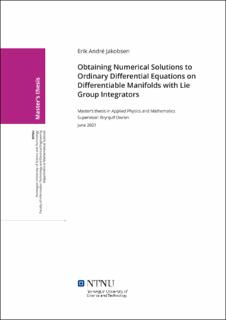| dc.contributor.advisor | Owren, Brynjulf | |
| dc.contributor.author | Jakobsen, Erik André | |
| dc.date.accessioned | 2021-09-15T17:29:21Z | |
| dc.date.available | 2021-09-15T17:29:21Z | |
| dc.date.issued | 2021 | |
| dc.identifier | no.ntnu:inspera:75366163:8970422 | |
| dc.identifier.uri | https://hdl.handle.net/11250/2778404 | |
| dc.description.abstract | Ordinære differensiallikningar (ODE-ar) er sentralt i fleire fagfelt; til dels mekanikk, finans, og det å lage vêrmeldingar. Dei velkjende Runge-Kutta metodane er ein av dei vanlegaste måtane å finne numeriske løysingar til ODE-ar på. Det kan likevel hende at desse løysingane har eigenskapar som ikkje svarar til det ein forventar ved å analysere likningane. Eit døme er når det er kjend at den analytiske løysinga høyrer til eit undermangfald M av det omkringliggjande rommet problemet er representert i.
Målet i denne avhandlinga er å introdusere PyLie, eit Python-rammeverk for å løyse ODE-ar ved bruk av ein type numeriske integratorar, kjend som Runge-Kutta Munthe-Kaas-metodane. Desse metodane er basert på Lie-grupper og deira tilhøyrande Lie-algebraar, og garanterer å konservere invariantar som ikkje nødvendigvis blir tilfredsstilt av dei vanlege Runge-Kutta-metodane. I avhandlinga blir den grunnleggjande teorien for metodane introdusert, etterfølgd av ei skildring av korleis dei vart implementert i Python.
PyLie brukast til å løyse tre ulike problem frå mekanikk, og samanliknast med implementeringa av ein Runge-Kutta-metode i det standard Python-biblioteket SciPy. Ein ser at PyLie gjer det som forventa når det gjeld orden for metodane, og å konservere på invariantar. Sistnemnde er i motsetnad til SciPy.
Avhandlinga konkluderer med forslag til framtidige forbetringar av programvara. | |
| dc.description.abstract | Ordinary differential equations (ODEs) are at the core of a number of subjects, including dynamics, finance, and predicting the weather.
The familiar Runge-Kutta methods are one of the most common ways of obtaining numerical solutions to ODEs.
However, the numerical solutions provided by these methods may exhibit qualities that do not align with what one would expect through analysis of the system of equations.
One example is when the exact solution is known to belong to some submanifold M of the ambient space in which the problem is represented.
The goal of this thesis is to present PyLie, a Python framework for a class of numerical integrators known as the Runge-Kutta Munthe-Kaas methods.
Based upon Lie groups and their associated Lie algebras, these methods guarantee the conservation of invariants that may not be satisfied by the standard Runge-Kutta methods.
The basic theory of such integrators is introduced, followed by the approach chosen for implementing them in Python.
The framework is applied to three different problems from dynamics and compared to the standard Runge-Kutta method as implemented in the standard Python package SciPy.
It is seen that PyLie performs as expected with respect to the order of the methods and the conservation of the equation's invariants, outperforming SciPy.
The thesis concludes with suggestions for further improvements that may be made to the software. | |
| dc.language | eng | |
| dc.publisher | NTNU | |
| dc.title | Obtaining Numerical Solutions to Ordinary Differential Equations on Differentiable Manifolds with Lie Group Integrators | |
| dc.type | Master thesis | |
